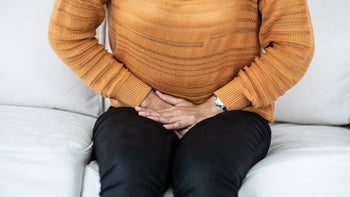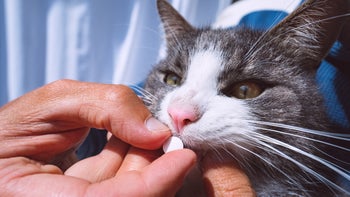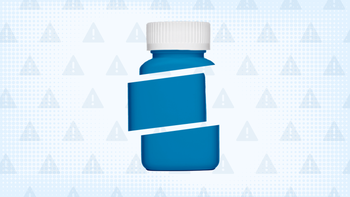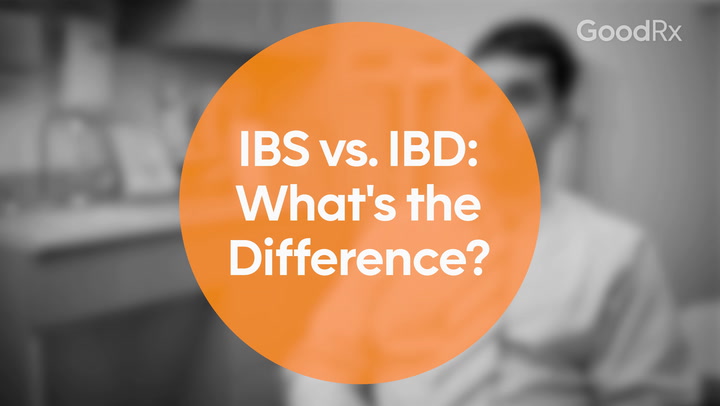GoodRx Guide
Irritable Bowel Syndrome (IBS): Symptoms, Causes, and Treatment
Comprehensive information for you or a loved one — including treatment options and discounts on popular medications.Irritable bowel syndrome (IBS) is a functional disorder. This means you have real symptoms, but there are no physical changes or significant inflammation in your bowels (gut). The bowels may work differently in people with IBS, but the inside of the intestines is often normal.
It’s not entirely clear what causes IBS. But it may have to do with how the intestines move.
IBS is a very common condition, but many people don’t know they have it. In the U.S., 15% of adults have symptoms of IBS. Only half of these people have an actual diagnosis of IBS.
What causes irritable bowel syndrome (IBS)?
Experts don’t know the exact cause of IBS. But there are some theories about why people may develop symptoms of IBS. These include:
The brain-gut connection: There’s evidence of two-way communication between your brain and your gut. In people with IBS, signals from the brain — like stress — can have a big effect on how the gut works. At the same time, signals from the gut can also trigger changes in mood and how the brain functions.
The gut microbiome: Normally, your gut has a balance between healthy and harmful bacteria. When the balance of bacteria in your gut is off, it can lead to IBS symptoms. This can happen after an infection like food poisoning.
Stress: Stressful or traumatic events may play a role in the development of IBS. These experiences could lead to chemical changes in your brain. This may affect how your gut moves and how you feel pain.
Risk factors for IBS
Experts don’t know exactly what causes IBS, but they have identified who is more likely to get it. Risk factors for IBS include:
Female sex
Having anxiety or depression
Eating a lot of ultra-processed or fatty food
Having a bacterial infection in your gut, like Clostridioides difficile (C. difficile) or Escherichia coli (E.coli)
Drinking alcohol
Having food allergies or food sensitivities
Going through stressful or difficult childhood events

IBS symptoms
Most people with IBS have abdominal pain and changes in their bowel movements, like diarrhea, constipation, or both.
If you have IBS, you may also have other symptoms, like:
Bloating
Gas
Mucus in your stool
Stomach cramps
Feeling of fullness after eating
Every person with IBS experiences their symptoms in a different way. Your symptoms might not be the same as someone else’s. And your symptoms might be different with each IBS flare. The severity of the symptoms may also vary from person to person and with each IBS flare.
Quiz: Do I Have IBS?
How is IBS diagnosed?
To diagnose IBS, a healthcare professional will start by asking you questions about your symptoms and medical history. They’ll also do a physical exam to rule out physical changes.
There isn’t one single test to diagnose IBS. But your healthcare professional might order other tests to make sure you don’t have other medical conditions — like inflammatory bowel disease (IBD), food intolerance, or colon cancer.
You may need tests like:
Stool studies
Hydrogen breath test
Labs (like checking iron levels, a complete blood count, or food allergy testing)
Types of IBS
There are several different types of IBS. Your treatment plan will depend on which subtype of IBS you have. After you’re diagnosed, your healthcare team may ask you to complete expert-designed questionnaires to help figure out your IBS subtype.
The subtypes of IBS include:
IBS-C (constipation): People with this subtype have a lot of constipation.
IBS-D (diarrhea): People with this subtype have a lot of diarrhea or loose stools.
IBS-M (mixed): People with this subtype can have a mix of hard stools and loose, watery stools.
IBS-U (unclassified): People with this subtype don’t have a consistent pattern to their stool changes.
Treatments for IBS
There are many different types of IBS treatments. Treatments may include changes in your diet and lifestyle as well as medications.
Treatment plans aim to improve symptoms and are based on your IBS subtype. Since IBS symptoms can be different for each person, treatments will be different too.
Diet
Different foods can trigger IBS flares. You can reduce flares and improve your symptoms by avoiding triggers. Here are some dietary changes that may help:
Eat more soluble fiber
Avoid foods with gluten
Eat more low-FODMAP (fermentable oligosaccharides, disaccharides, monosaccharides, and polyols) foods like nuts, strawberries, spinach, and eggs
Eat fewer high-FODMAP foods like dairy, beans, apples, and onions
Avoid common food triggers like spicy or fatty foods
Avoid common beverage triggers like alcohol, fizzy drinks, and caffeinated drinks
Lifestyle
In addition to changes in your diet, other lifestyle changes can help to decrease IBS symptoms. Here are a few tips you can try:
Get more exercise: Engaging in moderate aerobic activity like walking or cycling may improve IBS symptoms.
Stop smoking: Smoking can make IBS symptoms worse.
Get more sleep: Poor sleep habits may increase your IBS symptoms. Try to get 7 to 9 hours of sleep each night.
Stress management
There’s a strong association between stress and IBS. High levels of stress can make your IBS symptoms worse. And IBS symptoms can lead to more stress and anxiety. Fortunately, there are ways to manage stress, including:
Talking with a therapist
Trying cognitive behavioral therapy (CBT)
Using hypnotherapy techniques
Practicing mindfulness techniques for stress reduction
Medications for IBS
The medications used to treat IBS will depend on your symptoms and the subtype of IBS you have.
IBS-C
If you have IBS-C, constipation is a common problem. Over-the-counter (OTC) treatments that help soften your stool can provide some benefit.
Prescription medications for IBS-C include:
IBS-D
With IBS-D, you tend to have loose stools more often. Treatment usually focuses on calming gut irritation and reducing diarrhea. OTC antidiarrheal medications may reduce your number of loose stools.
Common prescription medications for IBS-D include:
IBS-M
People with IBS-M have mixed symptoms. The symptoms tend to alternate between diarrhea and constipation. This can sometimes make it hard to find the right medication. In many cases, dietary and lifestyle changes may be the most helpful.
Some medications help relieve the symptoms of IBS — no matter the subtype. These include:
Tricyclic antidepressants (TCAs) like amitriptyline, nortriptyline, and desipramine can decrease IBS symptoms by changing your perception of pain and improving your mood.
Antispasmodic medications like dicyclomine and hyoscyamine relax the muscles in your gut and improve movement. This may help with abdominal pain, cramping, and some of the stool changes with IBS.
Probiotics help balance the bacteria that are normally in your bowels. This can decrease irritation in your bowels caused by an overgrowth of unhealthy bacteria.
There are many treatment options for the symptoms of IBS. Your healthcare professional will work with you to figure out the best treatment plan based on your medical history and symptoms.
Preventing IBS flares
During an IBS flare, your symptoms like abdominal pain, bloating, constipation, or diarrhea get worse and harder to manage. Treatments like diet changes, lifestyle changes, stress management, and medications can all help lower the frequency or intensity of IBS flares.
The best way to prevent IBS flares is to pay close attention to what triggers your symptoms. Keeping a journal can help you track patterns. Ask yourself:
Are there foods that seem to be triggering an IBS flare? If so, avoid them.
Does stress seem like a common trigger? Think of ways to reduce stress. This can be anything from relaxation techniques to lowering your workload.
Am I sleeping well? If it’s hard to get quality sleep, work on sleep hygiene techniques.
Is it time to start taking medication? If you’re still having IBS flares even after avoiding triggers, talk to a healthcare professional you trust to see if a medication would be right for you.
Frequently asked questions
IBS is a gastrointestinal (GI) disorder, not a mental health disorder. But there are some links between IBS and your mental health. People with certain mental health conditions — like anxiety, depression, post-traumatic stress disorder (PTSD), and schizophrenia — are more likely to have symptoms of IBS.
Experts don’t know the exact reason for the association. But studies show that managing your mental health can improve symptoms of IBS and your quality of life.
Inflammatory bowel disease (IBD) includes conditions like Crohn’s disease and ulcerative colitis. Both IBS and IBD can cause abdominal pain and stool problems. But they’re different in important ways. IBD involves inflammation in the intestines, while the intestines in IBS will appear normal. IBD can also lead to other symptoms that people with IBS don’t experience. These can include fevers, blood in the stool, weight loss, and joint pain.
IBS can cause significant symptoms and decrease your quality of life, but it’s not a life-threatening condition. There’s no cure for IBS. This may be because the exact cause isn’t known. But there are many treatments available for IBS, so you can get your symptoms under control.
You should avoid foods that trigger your IBS flares. For many people, this means avoiding foods that are spicy, fatty, or full of gluten. Other common foods are those high in FODMAPs or filled with artificial sweeteners. You should also limit your intake of caffeine and alcohol.
References
American College of Gastroenterology. (n.d.). Irritable Bowel Syndrome (IBS).
Annaházi, A., et al. (2014). Role of antispasmodics in the treatment of irritable bowel syndrome. World Journal of Gastroenterology.
Carabotti, M., et al. (2015). The gut-brain axis: Interactions between enteric microbiota, central and enteric nervous systems. Annals of Gastroenterology.
Ceccherini, C., et al. (2022). Evaluating the efficacy of probiotics in IBS treatment using a systematic review of clinical trials and multi-criteria decision analysis. Nutrients.
Chang, F. (2012). Why do irritable bowel syndrome women often have nausea symptom?. Journal of Neurogastroenterology and Motility.
Eswaran, S. (2021). Low-FODMAP (Fermentable, Oligo-, Di-, Mono-saccharides And Polyols) diet. American College of Gastroenterology.
Fadgyas-Stanculete, M., et al. (2014). The relationship between irritable bowel syndrome and psychiatric disorders: From molecular changes to clinical manifestations. Journal of Molecular Psychiatry.
Fernandes, A. J. T., et al. (2024). Stress reduction and psychological therapy for IBS: A scoping review. Frontiers in Gastroenterology.
International Foundation for Gastrointestinal Disorders. (n.d.). Hypnosis for IBS.
Longstreth, G. F., et al. (2005). Functional bowel disorders. Gastroenterology.
National Institute of Diabetes and Digestive and Kidney Diseases. (2017). Eating, diet, and nutrition for irritable bowel syndrome. National Institutes of Health.
National Institute of Diabetes and Digestive and Kidney Diseases. (2017). Treatment for irritable bowel syndrome. National Institutes of Health.
Nilsson, D., et al. (2021). Gastrointestinal symptoms and irritable bowel syndrome are associated with female sex and smoking in the general population and with unemployment in men. Frontiers in Medicine.
Office on Women’s Health. (2021). Irritable bowel syndrome. U.S. Department of Health and Human Services.
Portincasa, P., et al. (2017). Irritable bowel syndrome and diet. Gastroenterology Report.
Posserud, I., et al. (2006). Functional findings in irritable bowel syndrome. World Journal of Gastroenterology.
Qin, H., et al. (2014). Impact of psychological stress on irritable bowel syndrome. World Journal of Gastroenterology.
Rome Foundation. (n.d.). Rome IV criteria.
Saha, L. (2014). Irritable bowel syndrome: Pathogenesis, diagnosis, treatment, and evidence-based medicine. World Journal of Gastroenterology.
Sulaimi, F., et al. (2025). Risk factors for developing irritable bowel syndrome: Systematic umbrella review of reviews. BMC Medicine.
Trindade, I. A., et al. (2022). Quality of life in irritable bowel syndrome: Exploring mediating factors through structural equation modelling. Journal of Psychosomatic Research.
Werlang, M. E., et al. (2019). Irritable bowel syndrome and dietary interventions. Gastroenterology and Hepatology.
Xie, C., et al. (2015). Efficacy and safety of antidepressants for the treatment of irritable bowel syndrome: A meta-analysis. PLoS One.
Zejnelagic, J., et al. (2021). Chronic stress and poor sleeping habits are associated with self-reported IBS and poor psychological well-being in the general population. BMC Research Notes.






























